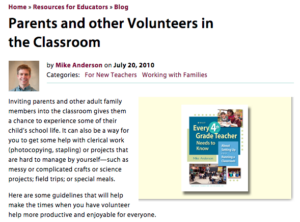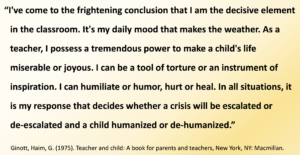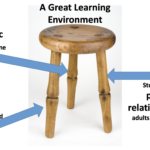Every Teacher Tips: Parents and Other Volunteers in the Classroom
Original Article: https://www.responsiveclassroom.org/blog/every-teacher-tips-parents-and-other-volunteers-classroom
 Inviting parents and other adult family members into the classroom gives them a chance to experience some of their child’s school life. It can also be a way for you to get some help with clerical work (photocopying, stapling) or projects that are hard to manage by yourself—such as messy or complicated crafts or science projects; field trips; or special meals.
Inviting parents and other adult family members into the classroom gives them a chance to experience some of their child’s school life. It can also be a way for you to get some help with clerical work (photocopying, stapling) or projects that are hard to manage by yourself—such as messy or complicated crafts or science projects; field trips; or special meals.
Here are some guidelines that will help make the times when you have volunteer help more productive and enjoyable for everyone.
Set expectations.
Just as children do, volunteers need to know what you expect of them when they’re in your classroom. Let them know how many children they’ll be working with, what they’ll be doing, and how long they’ll be staying.
Share classroom rules and routines.
Then, ask volunteers to comply with the rules and stick to the routines, explaining that this will avoid confusing or causing anxiety for the children. Tell volunteers that if children are not following rules and routines, they should let you know so that you can handle the discipline.
Ask that volunteers maintain children’s privacy.
Anything that happens in the classroom stays in the classroom. If they want to discuss something a student said or did, they should bring their concern to you.
Include a reminder about voice level.
Adult voices often carry further than we realize, and an adult’s raised voice can cause children to raise their voices as well. Ask volunteers to speak quietly to avoid disturbing other children.
Maintain consistent discipline.
Children sometimes behave differently when their parents come to school—pushing limits, using baby talk, or becoming aggressive or uncooperative. Let children know ahead of time that classroom rules still apply when their parents visit, and be ready to discipline firmly and kindly.
Give volunteers non-teaching roles.
Unless they are also teachers, volunteers probably won’t have the specific skills needed to lead writing conferences or run math groups. It’s best to invite volunteers to help out with special projects and do the day-to-day instruction yourself.
Put your expectations in writing.
Write up some simple guidelines for classroom visitors. You can send them home for parents to look over before they volunteer, or share them when volunteers arrive.
Try to involve all students’ parents and guardians in some way.
For many reasons, some parents cannot come to school during the day. Students may feel confused or hurt if their classmates’ family members are helping out in the classroom and their own are not. You can help by looking for other ways adults can contribute. For instance, someone who can’t come to school could cut out or staple things at home, or could contribute supplies for a project. Highlight these contributions so that students know their families are supporting their work in many different ways.
For many more ideas on building strong home-school connections, see Parents & Teachers Working Together by Carol Davis and Alice Yang, or search this website for articles on Working with Families.




